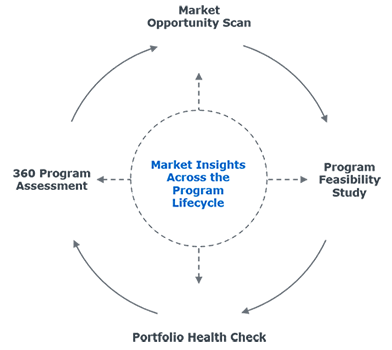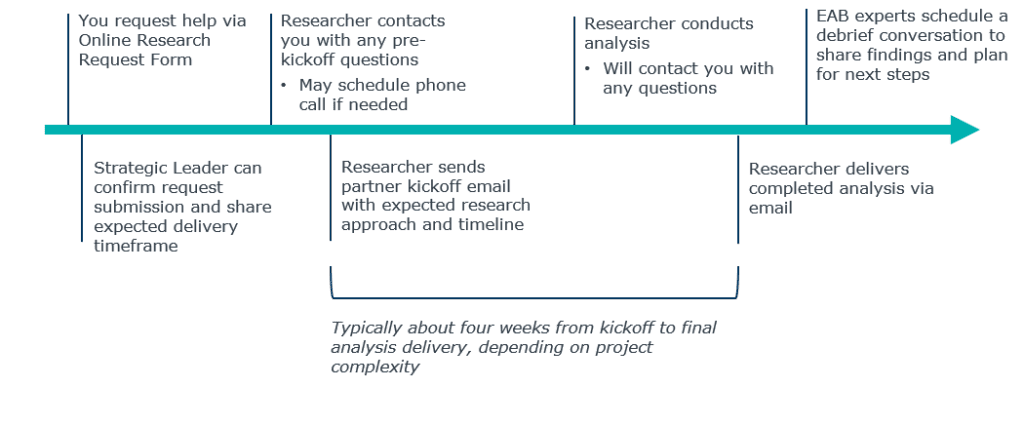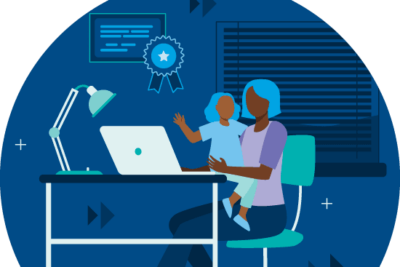EAB Market Insights
This service is available exclusively to Professional and Adult Education Advisory Services and Strategic Advisory Services – Comprehensive partners.
How we inform partners’ decision making
EAB pioneered the use of real-time labor market intelligence to help members design market-responsive credentials. Each year, our researchers interview hundreds of labor economists, program directors and industry thought leaders to identify programs likely to have a lasting impact on the workforce, appeal to students in both content and format, and support enrollment and revenue growth. Whether you’re vetting program ideas proposed by faculty, refreshing an existing set of degrees, or seeking new opportunities for launch, EAB Market Insights offers actionable recommendations and guidance to support continuous growth.
Questions we answer
- What’s the feasibility of this new program idea?
- How can I optimize this current program to today’s students’ needs?
- What new offerings should I develop?
- How do my degrees compare to regional need?
Project types

Program Feasibility Study
What it is: We’ll assess the market viability for a specific new program. This project always begins with a Market Pulsecheck, which examines workforce demand, student demand, and competitive landscape to provide a holistic measure of how well the program should attract students. After receiving the Market Pulsecheck, partners can request additional research into comparable programs, where we address questions around competitor program structures, curricula, and accreditation.
What to do next: If there is evidence for program demand, learn how to avoid common program launch mistakes or how to develop outcomes-focused recruitment messages. If there isn’t strong evidence, we can help surface potential new program opportunities with a Market Opportunity Scan.
360 Program Assessment
What it is: We’ll identify opportunities to update an existing program’s curriculum, positioning, and/or recruitment practices by analyzing employer demand in the field and auditing the program’s website and inquiry process. This project can help partners better position their program with prospective students.
What to do next: Understand how to improve discrete aspects of your inquiry process with our Lead and Inquiry Management Software Toolkit. Or, explore how to re-design student-centric credentials to best serve your audience.
Web Presence Audit
What it is: Offered for programs targeting adult learners, we’ll evaluate your web presence against best practices to enhance the prospective student experience and support recruitment. We can audit your unit webpage (e.g., continuing education landing page) and up to two specific program pages.
What to do next: Ensure webpage content increases student access and interest with our study Competing on Student Outcomes to Attract Today’s Career Changer. Also see our Reading List for Staying Current on SEO Trends and EAB’s How-To Guide for Validating Prospect Search Terms for more information on how to effectively optimize your program’s searchability.
Market Opportunity Scan
What it is: We’ll analyze regional employer demand and, where relevant, degree conferral trends to identify and rank viable new program opportunities. This helps our partners better understand their regional labor market needs and the programs best poised for growth. Scan can identify degree or nondegree opportunities.
What to do next: We can expand on the viability of one of the program ideas with a Program Feasibility Study. We can also help examine the best growth opportunities within your current program portfolio with a Portfolio Health Check.
Graduate and Adult Portfolio Health Check
What it is: We’ll assess how your current academic portfolio aligns to market demand and identify programs with the strongest growth potential. For master’s program portfolios, we’ll analyze your entire master’s degree portfolio campus-wide based on degree conferrals reported to the National Center for Education Statistics. For all other degree portfolios, this project is most effective when assessing 12-30 distinct degree programs.
What to do next: Learn how to use the program review process to prioritize programs for investment and address challenged programs with our Revitalizing the Program Portfolio. If looking to better understand and improve one program’s potential for growth, our 360° Program Assessment can help. If looking to add to your portfolio, we can help find potential new program opportunities with a Market Opportunity Scan.
See a Master’s Portfolio Assessment Example
The Professional & Adult Education Advisory Services market research service provided UMBC with employer demand data and actionable advice to successfully launch a degree program that aligned with faculty research interests, employment demand among regional health care providers, and the requirements of legislation such as the Affordable Care Act. Learn more by watching the video below.
How we do our research
We prioritize external demand signals from the labor market and student behavior
Over the years, we’ve evolved to focus on two primary indicators of programs’ potential to attract and serve students:
1. Is there relevant demand in the labor market?
Labor market data shows if there should be motivation for students to enroll. Career outcomes motivate adult students, in particular. Even for young undergraduates, however, students, their families, and school leaders all want to be sure students will graduate to viable careers.
Notably, not every program relates directly to a career outcome; schools often need a less-market-focused approach when considering liberal arts programs. We’ll always work with you to determine the best analysis for your programs’ needs.
2. Do measurable student behaviors suggest students will enroll?
After considering labor market data, degree conferrals data shows if students are behaving as we’d expect, and if there appears to be enough demand to accommodate existing and added programs. We’ll consider the level of competition suggested by degree conferrals and how many students a typical program graduates, so you can evaluate if that market landscape fits your program launch criteria.
Lightcast curates and maintains the most comprehensive labor market data sets available for academic program planning, providing real-time job posting data, workforce and alumni outcomes data, and traditional government sources of data
Multi-dimensional market data more thoroughly evaluates demand potential
Our research draws on a variety of data sources to answer questions about programs’ potential for enrollment success. Professional and Adult Education Advisory Services members enjoy access to real-time labor market intelligence via EAB’s partnership with Lightcast +
-
BLS projections
-
U.S. Census and American Community Survey data
-
Research interviews
-
Enrollment and conferral trends
-
Industry trends and literature
-
Pricing benchmarks
-
Competitor program positioning review
-
Peer program curriculum review
-
Prospect-facing website and inquiry process audits
You can also see answers to Frequently Asked Questions about our data and projects.
Beyond our analysis, program leaders should also incorporate additional sources to consider program viability more holistically. Further perspectives can include:
- Faculty, through tools such as a Faculty insight questionnaire
- Marketing and recruitment staff, preferably by integrating them into the program development process as outlined in Marketing Across the Program Lifecycle
- Frontline staff, by holding Frontline staff focus groups and other feedback options
- Students, using practices such as Voice-of-the-student surveys
- Employers, ensuring their participation through forums such as Actionable employer advisory boards
Typical Market Insights Request Lifecycle

EAB Market Insights resources beyond customized projects
Ongoing research into industry trends, adult student consumer behavior, and employer needs inform EAB’s Market Insights and your next steps
Each year, researchers take up the question of which offerings present the best balance of serving partners’ missions, ensuring graduates’ employability, and returning profit to the institution.
2013
Creating T-Shaped Professionals
- Second Bachelor’s Degrees for Career Starters
- Design Thinking Business Programs
Hyper-stackable Emerging Careers
- Cybersecurity Pathways
- Second Careers in Aging Services
2015
2017
Capitalizing on Creative Disruption:
2019
2021
2022
Ongoing
Insights

2 ways to address adult learners’ concerns about program flexibility
